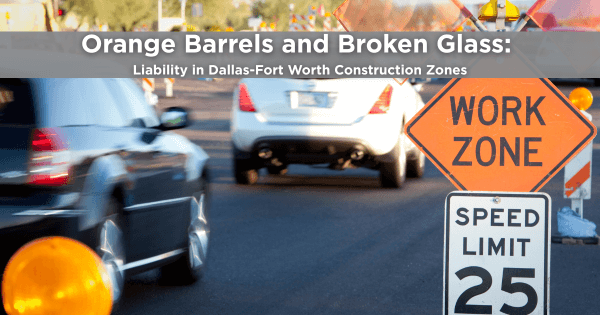Table of Contents:
I. Introduction: Navigating the Aftermath of an Accident in Fort Worth
II. Immediate Steps After an Accident in Fort Worth: Your Critical Checklist
III. Understanding Texas Personal Injury Law: The Foundations of Your Claim
IV. Types of Damages You Can Recover in a Texas Personal Injury Claim
V. The Personal Injury Claims Process in Texas: From Accident to Resolution
VI. Dealing with Insurance Companies: Protecting Your Rights
VII. Why Hire a Fort Worth Personal Injury Lawyer?
VIII. Frequently Asked Questions (FAQs) About Personal Injury Claims in Texas
IX. Conclusion & Next Steps: Get the Help You Deserve
X. Local Resources for Accident Victims in Fort Worth & Tarrant County
I. Introduction: Navigating the Aftermath of an Accident in Fort Worth
An accident, whether it’s a sudden car crash on I-35W, a slip and fall at a local Dallas-Fort Worth, Texas business, or a devastating truck accident in the State of Texas, can instantly turn your world upside down. Beyond the shock and physical pain, you’re likely facing mounting medical bills, lost wages, and overwhelming uncertainty about your future. In the busy Dallas-Fort Worth Metroplex, accidents are an unfortunate reality, and understanding your rights as a victim is paramount.
At the Howard Lotspeich Alexander & Williams, PLLC (HLAW), we understand the profound impact an unexpected injury can have on your life and your family. We see firsthand the challenges Dallas and Fort Worth residents face when dealing with complex legal processes and aggressive insurance companies. This comprehensive guide is designed to provide you with the clarity and actionable steps you need to navigate the confusing aftermath of an accident in Texas.
Our purpose is simple: to empower you with knowledge. While this guide offers detailed information about Texas personal injury laws and the claims process, it is not a substitute for personalized legal advice. Every accident and injury claim is unique. We strongly encourage you to contact an experienced Fort Worth personal injury attorney at the HLAW Law Firm for a confidential consultation to discuss the specifics of your situation.
Let’s begin your journey toward understanding your rights and seeking the compensation you deserve.
II. Immediate Steps After an Accident in Fort Worth: Your Critical Checklist
The moments immediately following an accident are often chaotic and frightening. However, the actions you take (or don’t take) in these crucial first hours and days can significantly impact your personal injury claim. This checklist focuses on what you should do after an accident in Fort Worth, Texas, to protect your health and your legal rights.
A. Safety First: Prioritize Your Well-being
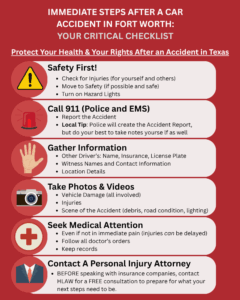
Protect your health and legal rights after a crash with this quick checklist of what to do immediately following an accident in Fort Worth, Texas.
- Check for Injuries: First and foremost, assess yourself and anyone else involved for injuries. Even if you don’t feel immediate pain, adrenaline can mask symptoms.
- Move to Safety (If Possible and Safe to Do So): If your vehicle is operational and moving it won’t cause further harm or risk, steer it to the side of the road or a nearby safe location. Turn on your hazard lights. If you’re on foot, get clear of traffic.
- Stay Calm: While difficult, try to remain calm. Panic can lead to poor decisions. Do your best to think clearly even turning on your hazard lights to make sure to alert drivers around the area that there has been a car wreck.
B. Call 911: Involve Law Enforcement and Emergency Medical Services
- Report the Accident: For any accident involving injuries, significant property damage, or disputes, call 911 immediately. In Dallas and Fort Worth, law enforcement (Dallas or Fort Worth Police Department or Texas Highway Patrol) will respond to traffic accidents.
- Request Medical Assistance: If anyone is injured, even if it seems minor, request an ambulance. Early medical documentation is crucial.
- The Accident Report: The responding police officer will likely create an official Texas Peace Officer’s Crash Report (CR-3). This report contains vital information, including details of the accident, involved parties, witness statements, and often, the officer’s initial determination of fault. How to Get Your Texas Accident Report: You can typically obtain a copy of your accident report from the Fort Worth Police Department’s website or records division a few days after the incident. Your attorney can also assist with this.
- Cooperate, But Don’t Speculate: Provide factual information to the police. Do not admit fault, make excuses, or speculate about what happened. Simply state the facts as you observed them.
C. Gather Information at the Scene: Document Everything
This is your opportunity to collect critical evidence that could support your claim.
- Exchange Information: Get the following from ALL other drivers involved: Full Name and Contact Information, Insurance Company and Policy Number, Driver’s License Number, Vehicle Make/Model/Year, and License Plate Number
- Identify and Collect Witness Information: If anyone saw the accident, ask for their name and contact information. Their unbiased account can be invaluable.
- Take Photos and Videos: Use your smartphone! Take pictures and videos of: Damage to all vehicles involved (close-ups and wider shots), Your injuries (bruises, cuts, swelling), The accident scene from different angles (skid marks, debris, traffic signals, road conditions, weather), Vehicle positions, Relevant surroundings (street signs, landmarks, cross streets), The other driver’s license plate and insurance card.
- Note Location Details: Be precise about where the accident occurred. Note the street names, nearest cross street, specific addresses, or highway markers.
- Avoid Discussions of Fault: Again, do not discuss the accident details to anyone other than the police or apologize. Anything you say can potentially be used against you.
Get Immediate Medical Treatment: Preserve Your Health Records
- Go to the ER/Urgent Care: Even if you feel fine, internal injuries or delayed onset pain (like whiplash) are common. Get checked out by a medical professional as soon as possible.
- Follow All Medical Advice: Adhere strictly to your doctor’s recommendations for follow-up appointments, specialists, physical therapy, and medications. Gaps in treatment can be used by insurance companies to argue your injuries aren’t serious. Keep Detailed Records: Maintain a log of all medical appointments, treatments, medications, and out-of-pocket expenses.
E. Do NOT Admit Fault or Give Recorded Statements to Insurance Companies
- Protect Your Statements: You are only required to report the accident to your own insurance company. You are NOT required to give a recorded statement to the at-fault driver’s insurance company without consulting an attorney.
- Beware of Quick Offers: Insurance adjusters may try to offer a quick, lowball settlement before you fully understand the extent of your injuries and damages. Do not accept or sign anything without legal counsel.
- Refer Them to Your Attorney: Once you hire a personal injury lawyer, they will handle all communications with insurance companies on your behalf, protecting your rights and ensuring you don’t inadvertently jeopardize your claim.
F. Contact the HLAW law firm as soon as possible.
- Early Legal Counsel is Critical: The sooner you involve an experienced personal injury attorney in Fort Worth, the better. They can advise you on your rights, guide you through the process, and protect you from common pitfalls.
- Free Consultation: Most personal injury lawyers, including the HLAW Law Firm, offer a free, no-obligation consultation to discuss your case. There’s nothing to lose by getting professional advice.
III. Understanding Texas Personal Injury Law: The Foundations of Your Claim
A personal injury claim in Texas is based on the concept of “negligence.” To recover compensation, you generally need to prove that another party’s negligent actions caused your injuries. Understanding these legal principles is fundamental to your case.
A. Negligence Explained: The Cornerstone of Your Claim
Negligence occurs when someone fails to act with the reasonable care that a prudent person would exercise under similar circumstances, resulting in harm to another. To prove negligence in Texas, four elements must typically be established:
- Duty of Care: The at-fault party owed you a legal duty to act reasonably (e.g., drivers have a duty to operate their vehicles safely).
- Breach of Duty: The at-fault party failed to uphold that duty (e.g., ran a red light, drove distracted, failed to maintain their property).
- Causation: The at-fault party’s breach of duty directly caused your injuries.
- Damages: You suffered actual, quantifiable harm (injuries, financial losses).
B. Texas Comparative Fault Law (Proportionate Responsibility)
Texas follows a modified comparative fault rule, often referred to as “proportionate responsibility.” This means:
- If you are found to be partially at fault for the accident, your compensation can be reduced by your percentage of fault.
- However, if you are determined to be more than 50% at fault (51% or greater), you are barred from recovering any damages from the other party.
- This rule highlights why it’s crucial to have legal representation; insurance companies will often try to shift blame to minimize their payout.
C. Statute of Limitations in Texas: Don’t Miss the Deadline!
A critical legal deadline in personal injury cases is the “statute of limitations.” In Texas, the general rule is that you have two (2) years from the date of the accident to file a personal injury lawsuit.
- Why it’s Crucial: If you don’t file a lawsuit within this two-year period, you will likely lose your right to pursue compensation, regardless of the merits of your case.
- Exceptions: While two years is the general rule, some exceptions can shorten or extend this period (e.g., claims against government entities have much shorter deadlines, claims involving minors may be extended). It’s always best to consult an attorney immediately to confirm the applicable deadline for your specific case.
D. Types of Accidents Covered by Personal Injury Law
Personal injury law in Texas covers a wide range of incidents where one person’s negligence causes harm to another. Some of the most common types of cases handled by the HLAW Law Firm include:
- Car Accidents: By far the most frequent type, involving collisions due to distracted driving, speeding, drunk driving (DWI), fatigued driving, reckless driving, or failure to yield.
- Truck Accidents: Collisions involving 18-wheelers, semi-trucks, and other commercial vehicles often result in catastrophic injuries due to their massive size and weight. These cases can be complex, involving federal trucking regulations.
- Motorcycle Accidents: Motorcyclists are highly vulnerable on the road, and accidents often lead to severe injuries.Pedestrian & Bicycle Accidents: When drivers fail to yield or act negligently around pedestrians and cyclists, devastating injuries can occur.
- Slip and Fall / Premises Liability: Accidents occurring on someone else’s property due to hazardous conditions (e.g., wet floors, uneven surfaces, poor lighting) that the property owner knew or should have known about.
- Dog Bites: Texas law has specific rules regarding liability for dog bites, often related to the owner’s knowledge of the dog’s dangerous propensities.
- Wrongful Death: When an individual dies due to the negligence or wrongful act of another, surviving family members may pursue a wrongful death claim for their losses.
IV. Types of Damages You Can Recover in a Texas Personal Injury Claim
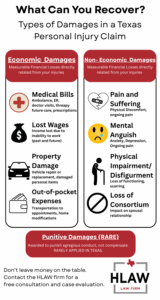
Understanding your rights after an accident starts with knowing what you can recover. This breakdown of damages helps Texas injury victims see what compensation may be available under the law.
If you’ve been injured due to someone else’s negligence in Texas, you may be entitled to recover various types of damages. These damages aim to compensate you for the losses you’ve suffered and put you back in the position you would have been in had the accident not occurred.
A. Economic Damages (Quantifiable Losses)
These are measurable financial losses directly resulting from your injury.
- Medical Expenses: This includes all costs related to your treatment, from the ambulance ride and emergency room visits to surgeries, doctor appointments, physical therapy, prescription medications, medical devices, and even estimated future medical care.
- Lost Wages: Compensation for income you lost due to your inability to work after the accident. This can include hourly wages, salary, commissions, bonuses, and even lost vacation or sick days.
- Loss of Earning Capacity: If your injuries prevent you from performing your job duties or force you into a lower-paying role, you can seek compensation for the future income you will no longer be able to earn.
- Property Damage: Cost to repair or replace damaged property, most commonly your vehicle, but could also include personal items damaged in the accident.
- Out-of-Pocket Expenses: Any other accident-related expenses you incurred, such as transportation costs to medical appointments, childcare, or home modifications needed due to your injuries.
B. Non-Economic Damages (Non-Quantifiable Losses)
These are subjective, non-monetary losses that impact your quality of life. They are more challenging to quantify but are equally important.
- Pain and Suffering: Compensation for the physical pain and discomfort you’ve endured, both immediately after the accident and ongoing.
- Mental Anguish / Emotional Distress: This includes anxiety, fear, depression, PTSD, or other emotional and psychological trauma resulting from the accident.
- Physical Impairment/Disfigurement: Compensation for the loss of use of a body part, disfigurement (e.g., scarring), or the inability to perform daily activities or participate in hobbies you once enjoyed.
- Loss of Enjoyment of Life: If your injuries prevent you from engaging in activities that brought you joy and fulfillment prior to the accident.
- Loss of Consortium: In certain cases, a spouse may claim damages for the loss of companionship, affection, and intimacy due to the injured spouse’s injuries.
C. Punitive Damages (Exemplary Damages in Texas)
In Texas, punitive damages (also called “exemplary damages”) are rarely awarded in personal injury cases. They are not intended to compensate the victim but rather to punish the at-fault party for exceptionally egregious conduct and to deter similar actions in the future. To be awarded punitive damages, you typically need to prove that the defendant’s conduct was grossly negligent, malicious, or fraudulent.
V. The Personal Injury Claims Process in Texas: From Accident to Resolution (IMAGE)
Understanding the typical steps involved in a Texas personal injury claim can help demystify the process and alleviate some of your stress. While every case is unique, the general flow often follows these stages:
A. Initial Investigation & Evidence Gathering
- Your Role: This begins with the immediate steps you take at the accident scene (as detailed in Section II).
- Your Attorney’s Role: Your Fort Worth personal injury attorney will launch a thorough investigation. This includes:
- Obtaining the police report and any accident reconstruction reports.
- Collecting all medical records and bills related to your injuries.
- Gathering witness statements.
- Analyzing photos, videos, and other evidence from the scene.
- Working with experts (e.g., accident re-constructionists, medical specialists, economists) if needed.
- Determining all liable parties.
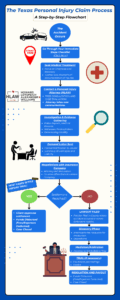
From accident to resolution, this flowchart walks you through each phase of a Texas personal injury claim. Know what to expect—and how HLAW can help every step of the way.
B. Demand Letter
Once you have completed medical treatment or reached maximum medical improvement (MMI), your attorney will compile all evidence and losses into a comprehensive “demand letter.” This letter formally notifies the at-fault party’s insurance company of your claim, outlines the facts of the accident, details your injuries and damages, and demands a specific amount of compensation to settle the claim.
C. Negotiation with Insurance Companies
- Initial Offers: The insurance company will review the demand letter and typically respond with a counter-offer. Be prepared: initial offers are often significantly lower than what your case is truly worth.
- Attorney’s Role: This is where the skill and experience of your personal injury lawyer are crucial. They will negotiate aggressively on your behalf, countering low offers, providing additional evidence, and advocating for the full value of your claim. They understand the tactics insurance companies use to minimize payouts.
D. Filing a Lawsuit (If Settlement Not Reached)
If negotiations with the insurance company fail to produce a fair settlement, your attorney will recommend filing a personal injury lawsuit. This doesn’t necessarily mean your case will go to trial; most lawsuits settle before reaching a courtroom.
- Petition: Your attorney files a formal complaint (petition) with the appropriate court, outlining your claims against the at-fault party.
- Discovery: Both sides exchange information and evidence through various formal processes, including:
- Interrogatories – Written questions answered under oath
- Requests for Production: Requests for documents and evidence.
- Depositions: Oral testimony given under oath by involved parties and witnesses.
E. Mediation & Arbitration
Before or during the lawsuit phase, many personal injury cases in Texas are resolved through alternative dispute resolution (ADR) methods:
- Mediation: A neutral third-party mediator facilitates discussions between you and the insurance company/defendant, helping you reach a mutually agreeable settlement. Mediation is a common and often successful way to resolve cases without trial. Fort Worth has many skilled mediators specializing in personal Injury cases.
- Arbitration: A neutral third-party arbitrator hears evidence and makes a binding or non-binding decision.
F. Trial (If Necessary)
If all attempts at settlement or ADR fail, your case may proceed to trial. This involves:
- Jury Selection: Choosing jurors.
- Opening Statements: Attorneys present their case overview.
- Presenting Evidence: Witnesses testify, documents are introduced.
- Closing Arguments: Attorneys summarize their cases.
- Verdict: The jury or judge delivers a decision.
G. Appeals
If either party is dissatisfied with the trial outcome, they may have the right to appeal the decision to a higher court.
VI. Dealing with Insurance Companies: Protecting Your Rights
Insurance companies, even your own, are businesses focused on their bottom line. Their primary goal is to minimize the amount they pay out in claims, not necessarily to ensure you are fully compensated. This adversarial dynamic makes dealing with them particularly challenging for accident victims.
A. Your Own Insurance vs. The At-Fault Driver’s Insurance
- Your Policy: You are required to report the accident to your own insurance company. They may handle initial medical payments (if you have MedPay) or property damage claims.
- At-Fault Driver’s Policy: This is the company that will ultimately be responsible for paying your personal injury damages. Their adjuster represents their client (the at-fault driver), not you.
B. Understanding Uninsured/Underinsured Motorist (UM/UIM) Coverage
In Texas, while car insurance is mandatory, many drivers are uninsured or carry only minimum coverage. UM/UIM coverage is an optional but highly recommended addition to your own policy. If the at-fault driver has no insurance or insufficient insurance to cover your damages, your UM/UIM coverage can step in to protect you. This is a claim made against your own policy, but it still often requires skilled legal negotiation.
C. Tips for Dealing with Adjusters (If you have to talk to them before you hire a lawyer)
- Be Polite, But Firm: Remain courteous but understand their objective.
- Provide Basic Information Only: Give your name, contact information, and policy number.
- Do NOT Give Recorded Statements: Politely decline any requests for recorded statements about the accident details or your injuries. Simply state that you are not prepared to give a statement at this time.
- Do NOT Speculate or Admit Fault: Even a simple “I’m sorry” can be misconstrued as an admission of fault.
- Do NOT Sign Anything: Never sign medical releases or settlement offers without first consulting with a personal injury attorney. Signing a general medical release gives the insurance company access to all your medical history, not just accident-related records.
- Keep a Log: Document all communications with insurance adjusters, including dates, times, names, and what was discussed.
D. How a Lawyer Changes the Dynamic
Once you hire a personal injury lawyer from the HLAW Law Firm, all communications with insurance companies will go through your legal team. This immediately levels the playing field. Your attorney will:
- Handle all phone calls, paperwork, and negotiations.
- Prevent you from saying anything that could jeopardize your claim.
- Ensure you receive the full and fair compensation you deserve.
- Protect your rights from predatory insurance practices.
VII. Why Hire a Fort Worth Personal Injury Lawyer?
After an accident, you’re recovering from injuries, dealing with stress, and likely overwhelmed. Adding the complexities of a legal claim to that burden can be too much. This is precisely why having an experienced Fort Worth personal injury attorney on your side is not just helpful, but often essential.
A. Navigating Complex Legal Procedures
Texas personal injury law is intricate. There are specific rules of evidence, court procedures, filing deadlines (statutes of limitations), and legal precedents that apply. Without a deep understanding of these complexities, you risk making critical errors that could undermine your case. An attorney knows the law and how to apply it to your specific situation.
B. Maximizing Your Compensation
Insurance companies are experts at minimizing payouts. They have vast resources and strategies designed to reduce your claim’s value. An attorney knows how to:
- Accurately Assess Damages: They can identify all potential economic and non-economic damages, ensuring nothing is overlooked.
- Gather Compelling Evidence: They know what evidence is needed to prove negligence and the full extent of your injuries.
- Negotiate Effectively: They have the negotiation skills and legal leverage to counter lowball offers and fight for the maximum compensation you deserve. Studies often show that injured individuals with legal representation receive significantly higher settlements than those without.
C. Dealing with Insurance Companies on Your Behalf
This is perhaps one of the most significant benefits. Your attorney will handle all communication with insurance adjusters, allowing you to focus on your recovery. They will protect you from misleading questions, settlement traps, and pressure tactics.
D. Access to Resources
Experienced personal injury firms like the HLAW Law Firm have established networks of professionals, including:
- Medical Experts: To provide second opinions or expert testimony on your injuries and prognosis.
- Accident Re-constructionists: To recreate the accident scene and provide expert analysis.
- Investigators: To gather crucial evidence.
- Financial Experts: To calculate lost earning capacity and future medical costs.
E. Peace of Mind
Knowing that a dedicated legal team is fighting for your rights can significantly reduce your stress and allow you to concentrate on healing. You won’t have to worry about answering tricky questions from adjusters, filling out complex forms, or navigating the court system alone.
F. Cost-Effective Representation: Contingency Fees Explained
Many accident victims hesitate to hire a lawyer because they worry about upfront costs. At the HLAW Law Firm, we work on a contingency fee basis for personal injury cases. This means:
- You Pay Nothing Upfront: You won’t owe any attorney fees unless we win your case through a settlement or trial verdict.
- No Win, No Fee: If we don’t recover compensation for you, you owe us nothing in attorney fees.
- Our Fee Comes from the Recovery: Our fee is a pre-agreed-upon percentage of the final settlement or award. This aligns our interests directly with yours: the more compensation you receive, the more we earn.
G. Why Choose the HLAW Law Firm for Your Fort Worth Personal Injury Claim?
At HLAW, our attorneys are deeply rooted in the Fort Worth community. We bring:
- Extensive Experience: Our team has a proven track record of successfully handling a wide range of personal injury cases across Texas, including complex wrongful death, car, truck, and premises liability accidents.
- Former Prosecutors and Trial Lawyers: Our unique background as former prosecutors and courtroom litigators gives us an invaluable perspective on building strong cases and understanding litigation strategies, which we apply to our personal injury practice.
- Client-Centered Approach: We prioritize clear communication, personalized attention, and aggressive advocacy to achieve the best possible outcome for each client.
- Local Knowledge: Our familiarity with Tarrant County courts, local procedures, and even specific accident hot spots in Fort Worth provides an advantage in your case.
- Reputation for Excellence: We are dedicated to upholding our reputation for aggressive and ethical representation, fighting tirelessly for our clients’ rights.
VIII. Frequently Asked Questions (FAQs) About Personal Injury Claims in Texas
Here are answers to some of the most common questions we receive from accident victims in Fort Worth:
Q1: How much is my personal injury case worth? A: There’s no average or magic number. The value of your case depends entirely on the unique facts, including the severity of your injuries, the medical treatment required, lost wages, pain and suffering, and the clarity of fault. An attorney can provide a more accurate estimate after a full review of your case.
Q2: How long does a personal injury claim take in Texas? A: The timeline varies greatly. Simple cases with clear liability and minor injuries might settle in a few months. More complex cases involving serious injuries, extensive medical treatment, multiple parties, or the need for a lawsuit can take a year or more, sometimes several years if it goes to trial.
Q3: What if I can’t afford medical treatment after an accident? A: This is a common concern. An experienced personal injury attorney can often help you get the medical care you need, even if you don’t have health insurance or cash upfront. This might involve working with providers who agree to be paid out of your settlement or connecting you with resources.
Q4: Do I have to go to court? A: Most personal injury cases in Texas settle out of court through negotiation or mediation. While the HLAW Law Firm prepares every case as if it will go to trial, only a small percentage actually do. The decision to go to trial is always made in consultation with you.
Q5: What if the accident was partially my fault? A: Texas’s modified comparative fault rule (the 51% rule) means you can still recover damages if you are 50% or less at fault. Your compensation will be reduced by your percentage of fault. If you are found to be 51% or more at fault, you cannot recover. This makes proving fault crucial.
Q6: Can I still claim if I was a passenger in an accident? A: Yes. If you were injured as a passenger due to the negligence of any driver (yours or another vehicle’s), you generally have a valid personal injury claim.
Q7: How much does a personal injury lawyer cost in Fort Worth? A: Most personal injury lawyers, including Howard Lotspeich Alexander and Williams, PLLC (HLAW), work on a contingency fee basis. This means you pay no upfront legal fees, and your attorney’s fee is a percentage of the compensation they recover for you. If they don’t win, you don’t pay attorney fees.
Q8: Should I accept the first settlement offer from the insurance company? A: Almost never. Initial offers are typically low and designed to resolve your claim quickly and cheaply, before the full extent of your injuries and damages are known. Always consult an attorney before accepting any settlement offer.
IX. Conclusion & Next Steps: Get the Help You Deserve
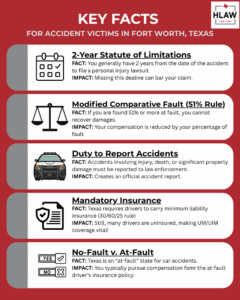
Know your rights after an accident. This quick-reference guide highlights five essential legal facts every Fort Worth injury victim should understand.
Experiencing a personal injury accident in Fort Worth can be a traumatic and life-altering event. While this guide provides a comprehensive overview of your rights and the legal process in Texas, remember that you don’t have to navigate this complex journey alone.
The choices you make immediately after an accident, and the legal representation you secure, can profoundly impact your ability to recover financially and physically. Insurance companies have teams of lawyers and adjusters working to protect their interests; you deserve equally dedicated and experienced advocates fighting for yours.
At the HLAW Law Firm, we are committed to providing compassionate yet aggressive legal representation to accident victims across the Dallas-Fort Worth Metroplex. Our team will tirelessly investigate your case, gather evidence, negotiate with insurance companies, and if necessary, represent you vigorously in court. Our goal is to alleviate your burden so you can focus on what truly matters: your recovery.
Don’t delay. The statute of limitations is ticking, and evidence can disappear.
Contact the HLAW Law Firm today for a free, no-obligation consultation to discuss your Fort Worth personal injury claim. Let us help you understand your options and seek the justice and compensation you deserve.
Call us now at 817-993-9249 or fill out our online contact form to schedule your free consultation and case evaluation today.
X. Local Resources for Accident Victims in Fort Worth & Tarrant County
Here are some helpful resources for accident victims in our local community:
•Fort Worth Police Department (FWPD): https://police.fortworthtexas.gov/home
◦Accident Report Request: https://police.fortworthtexas.gov/How-Do-I/Get-Copy-Accident-Report-
•Tarrant County District Clerk’s Office: https://www.tarrantcountytx.gov/en/district-clerk.html
•Texas Department of Transportation (TxDOT): https://www.txdot.gov
◦Crash Report Request (for statewide reports): https://www.txdot.gov/data-maps/crash-reports-records.html
•Local Hospitals & Medical Centers in Fort Worth:
-Baylor Scott & White: https://www.bswhealth.com
-Texas Health Harris Methodist Hospital Fort Worth: https://www.texashealth.org/Locations/texas-health-fort-worth
-Medical City Fort Worth: https://www.medicalcityhealthcare.com/locations/medical-city-fort-worth- hospital
•Texas Bar Association: https://www.texasbar.com
•Texas Civil Practice and Remedies Code: https://statutes.capitol.texas.gov/docs/sdocs/civilpracticeandremediescode.pdf
[UPDATED 05/28/2025]








